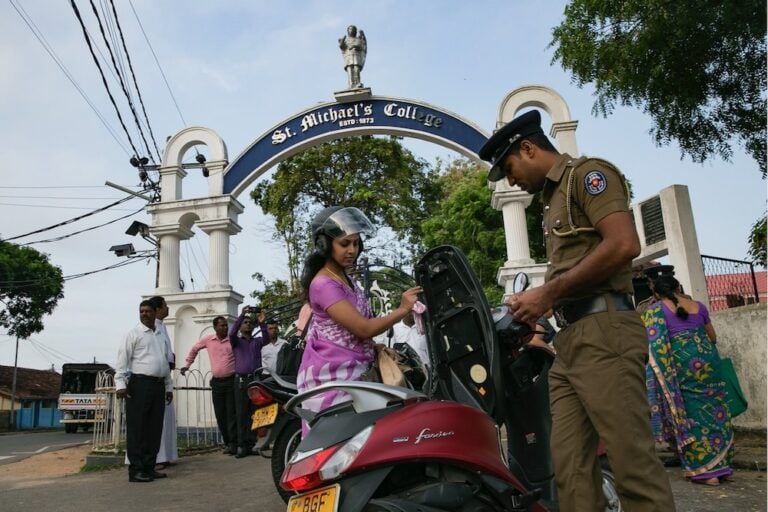(FMM/IFEX) – The following is an abridged version of a 30 October 2008 FMM special report: Statement by the Free Media Movement (FMM) on the new Private Television Broadcasting Station Regulations The Minister of Mass Media and Information has on 10th October 2008 promulgated a new set of regulations cited as the Private Television Broadcasting […]
(FMM/IFEX) – The following is an abridged version of a 30 October 2008 FMM special report:
Statement by the Free Media Movement (FMM) on the new Private Television Broadcasting Station Regulations
The Minister of Mass Media and Information has on 10th October 2008 promulgated a new set of regulations cited as the Private Television Broadcasting Station Regulations, under powers conferred by the Sri Lanka Rupavahini Act, No.6 of 1982. These new regulations seek to regulate all aspects of private television broadcasting, including classification of stations and services; issue, revocation, and duration of licenses; fee structure; territorial coverage; ownership; duties and responsibilities of private television broadcasters; extended powers of the Ministry; and content controls.
The Free Media Movement (FMM) strongly believes that the new regulations give cause for serious alarm on a number of points. Our preliminary concerns are as follows:
Classification of Private Television Broadcasting Stations:
The regulations seek to classify private television broadcasters on the basis of geographical coverage (as international, country-wide or regional stations), on the basis of technology used (as analogue or digital), on the basis of whether a station uses its own or others’ broadcast transmission infrastructure, and on the basis of the method used to access the viewer (as a terrestrial, cable, satellite, internet, or mobile telephony based broadcasting station). While classification per se is not inherently problematic for purposes of necessary legal regulation, it is not clear how the classification referred to as ‘method used to access the viewer’ would work in practice. For example, it is not clear how the requirement of a license for a broadcaster using the internet or mobile telephony as the method of accessing the viewer would be applied and enforced in practice given that potentially any person with access to the internet and a mobile camera phone could be regarded as a ‘broadcaster’. In such circumstances, at the very least, the scheme of licensing envisaged by the regulations is impractical and unworkable (whether the legal responsibility under licence lies with a ‘citizen-broadcaster’ or internet service provider). More seriously, however, such a system seriously hampers freedom of expression using readily accessible modern technology, and departs from developing forms and methods of expression all over the world.
Citizenship Requirements:
The new regulations provide that an application to the Minister for a licence to operate a private television station may only be made by a Sri Lankan citizen, a partnership in which all the partners are Sri Lankan citizens, a company in which the majority shareholding is held by Sri Lankan citizens, or a statutory body. In the modern context of the globalised economy and trans-national technology, we find this to be an unusual requirement.
The Ineligibility of Political Parties to obtain a Private Television Broadcasting License:
The new regulations prohibit a recognised political party from applying for a license. While in itself this may seem a legitimate restriction, in the Sri Lankan context in which state-owned media institutions operate in practice, not as public service broadcasters, but as politically partisan mouthpieces for the political party in power, we are firmly of the view that this restriction on private broadcasting licensing would serve only to aggravate that anomaly. Moreover, the new regulations require that where a license-holder becomes a member of a political party during the term of a license, s/he shall be obliged to surrender the license. This is inappropriate in that a mere member of a political party is precluded from holding a license.
Duration of License:
The regulations provide that a private television license will only be for the duration of one year. This is inconsistent with the international average of a television broadcasting license, which is generally seven years.
Cancellation of License:
The regulations provide that, among other reasons, a license may be cancelled by the Minister if the licensee broadcasts programmes which: are detrimental to the interests of national security; incite breakdown of public order; incite ethnic, religious or cultural hatred; are in violation of any law; are morally offensive or indecent; are detrimental to the rights and privileges of children; or are in violation of the code of ethics, standards and practices of television broadcasting. This is an extremely alarming provision which in our view is entirely inconsistent with modern international standards governing freedom of expression and broadcasting balanced against legitimate competing interests. It gives the Minister too broad a power of undefined scope to regulate content and opens up the possibility of capricious decisions to cancel licenses and impose punishment.
To read the full report, see: http://tinyurl.com/57y3qj


